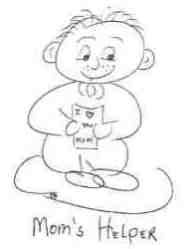He was known as Joseph, son of Jacob. Although born in Bethlehem , no one knew
exactly when he had arrived in Nazareth , but he had been there for a number of years. Perhaps Galilee was a favorable place to ply his trade, and family financial circumstances necessitated a earning a living. A polite, quiet, righteous man, Joseph went about his work with dispatch and efficiency. By trade, Joseph was a tekton –a mechanic of sorts, but in particular, a carpenter. Most of the houses in town showcased his craftsmanship: tables, chairs, bed frames and cabinets of various sizes and design were testament to his skill. No one could remember when he did not live alone.
He was well into his maturity when he announced his intention to marry a young woman from Nazareth . Years later, learned men would write about circumstances surrounding his engagement, marriage, and birth of a son, but at the time, it went almost unnoticed. Joseph was a God-fearing servant. He was most troubled when it became known to him that young woman he betrothed was with child. He quietly made plans to separate himself from her. However, when Joseph was informed by an angel as he slept to be not afraid and take Mary as his wife, for that which is conceived in her, is of the Holy Spirit; Joseph, did as the angel of the Lord commanded him, and took unto him his wife.
A few months later, a decree issued by Caesar Agustus, required Joseph and his expectant wife go to Bethlehem to be counted in the census. Arriving in the town of his birth, Joseph found no room for them in the inn. How troubling it must have been for this holy man at the time of his wife to give birth. What were his thoughts about the coming of shepherds, and the wise men? Whatever wonderings anxieties and uncertainties Joseph faced, he never spoke about them. The historical record is silent.
After the birth of Jesus, Joseph was told by an angel to flee into Egypt to escape the jealousy and wickedness of a ruling tyrant. Once again, Joseph waited until directed by angels to return to Palestine , eventually settling again in Nazareth . With sublime simplicity and obedience, Joseph returned to his trade and supported himself and his family by skillfully crafting useful objects from wood. He spent time teaching his young son the skills of his trade not fully understanding all which would be asked of the boy named Jesus. As a devout, pious man, he observed that which was commanded by the Law, living out his life in an uneventful manner. He was to die before Jesus began his public ministry.
How many people alive today would have followed the example set by Joseph? So many individuals seek prominence, celebrity, and display a flamboyant lifestyle: too many misuse their abilities, talent, and skills. Rampant in today’s society is the “Me-me-me” mind set. Selfishness seems to be the norm rather than the exception. Those who are privileged to be called “teacher” are fortunate indeed. When one thinks about it, we are all teachers.. We learn from each other. When the final accounting of our days is recorded, what will our “permanent record” record reveal? Will it be one of faithful servant: compassionate, understanding, obedient, and charitable goodness? Will the performance of our duties serve as a guide for others who follow?
The father of the carpenter would have it no other way. He understood that those who build and those who teach, use many methods and materials. He understood, too, that when the lesson is well designed and presented, the strength, purpose and beauty of one’s lifetime endure. Although historical information is limited, remembrance of the father of the carpenter and is vibrant and strong over 90 generations later.
Again, the question: What will a review and remembrance of our “permanent record” revealto those whose lives we touched?


No comments:
Post a Comment